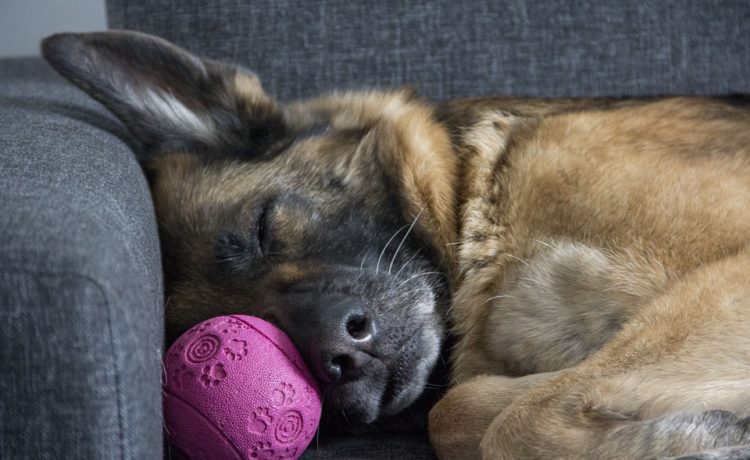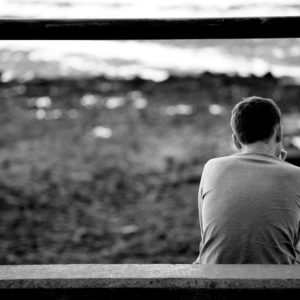Your alarm goes off at 6am. You jump out of bed and you don’t even hit snooze once. You’re alert, energized, and ready to take on the day – even though it’s Monday. You feel refreshed and ready to go!
Wait – you mean to tell me that’s not how you always start your day?
Of course not. That’s not how most of us start our days. It’s more like rolling out of bed in a half conscious state until we stumble over to the coffee maker (or out the door to Starbucks) and we wait until that caffeine hits us to feel like a functional human being.
You could feel as bright eyed as that imaginary person described above – but you (once again) didn’t get enough sleep. Who’s been there? Show of hands? Everyone? That’s what I thought.
According to the American Sleep Association, 37% of 20-39 year olds and 40% of 40-59 year olds report not getting enough sleep each night. So what? Doesn’t a lack of sleep just make you tired? Can’t that just be fixed by more coffee and a “powering through” mentality? Nope. Sorry. Check out the chart below, courtesy of John Hopkins Medicine –
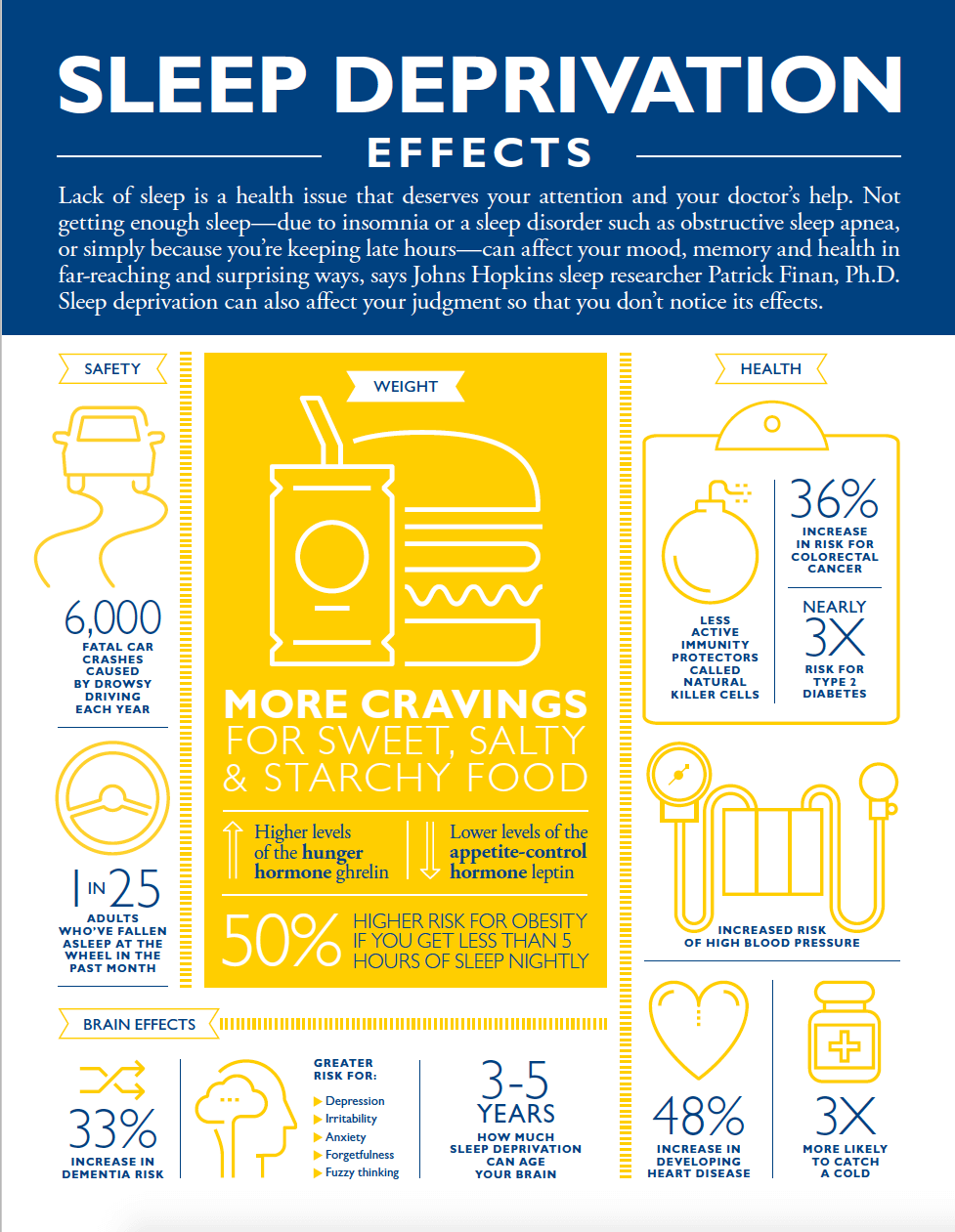
I know, those are some scary statistics. Don’t worry, most sleep woes could be solved by practicing better sleep hygiene. What is sleep hygiene? It’s a set of best practices and routines that have been shown to optimize your sleep. The good news is that they are relatively easy to implement. Pick your favorites from the list below, or try them all!
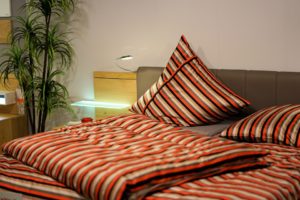
Noise
There’s only so much you can do about noise if you live with another person, pets, or in an urban environment, but there are small tweaks you can make to try to make your space as quiet as possible. Ear plugs, white noise, or even a fan can drown out unwanted sounds. There are tons of white noise apps for your phone or tablet (I’m personally a fan of this one), or a sound machine can be purchased for an affordable price (like this one). Ear plugs can be uncomfortable to sleep in for some people, but a last resort if nothing else will block out that garbage truck that loves to come by before 6am.
Light
This might seem pretty obvious, but your sleeping space should be as dark as possible. Make sure your windows aren’t letting the sun say good morning to you too early, and try to put up some blinds/shades if that’s the case. Try to turn off any lights that you don’t absolutely need thirty to sixty minutes before bed to start getting your mind and body in relaxation mode.

Technology
This is the hard one. The light that comes from your phone, computer, and tablet are keeping you up at night, even with that handy feature of “night mode”. I know that it can be close to impossible to avoid all of these things for up to an hour (which is the ideal) before bedtime, so try to put them away as early as possible before trying to sleep. It also reduces the temptation to continue scrolling through all the cute pictures of puppies on Instagram when you should be drifting off into a deep slumber.
Bed Time Routine
It’s incredibly helpful to create, and stick to, a bed time routine so your body and mind get into sleep mode more easily. Just like professional athletes have a pre-game routine that their minds are trained to respond to, you can have the same effect with sleep. Do some light stretching, meditation, read a book (not from a tablet!), write in a journal, or any other relaxing activity as a way to wind down. You can then brush your teeth, wash your face, or however else you usually get for bed, before finally setting in to sleep. Whatever your routine looks like, make sure you repeat it everyday (or as close to everyday as possible). Your body will soon adjust and sleep will be something you’ll do on autopilot at the end of the nightly routine. This also means going to bed and waking up at the same time each night. This is another tricky one. It sounds pretty good in an ideal world, but most of us don’t live in an ideal world. Life gets in the way and it’s not always possible to go to bed by 11pm every night. The solution? Just do the best you can. No one’s perfect, so your sleep hygiene isn’t going to be perfect either. Being mindful of and trying to keep up the routine as much as possible will make a world of difference even if you can’t stick it to it every single night for the rest of your life.
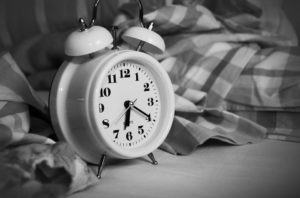
Make Healthy Choices
Exercising regularly, eating healthy, and avoiding alcohol and stimulants before bed can all help you get the zzzz’s that you need. That doesn’t mean you need to exhaust yourself in the gym every night or give up your happy hour. Making exercise a part of your regular routine has been shown to help sleeping patterns, even if you aren’t busting your ass in boot camp classes everyday. You can still go out for drinks with friends after work, but maybe skip that third or fourth glass of wine. You can still stop off and visit your favorite barista, but try to cut that late afternoon jolt. It could be harming your sleep even if you aren’t going to bed until several hours later.
If these tips seem overwhelming, don’t worry. You don’t have to tackle everything at once, or change your entire lifestyle overnight. Even if little changes are the only thing you can make happen right now, they’ll still have a bigger impact than doing nothing at all. You can experiment with each of these ideas, and see what makes a difference. Start small and work your way up. Once you’re starting to sleep better, you’ll have even more energy to make bigger changes later on!
Questions about sleep? Having a hard time sticking to a routine? Still struggling to sleep even after making changes? Reach out to us and see how we can help!
Author: Rachel
Rachel is a licensed therapist and co-founder of Viva Wellness. She gets most of her inspiration for the blog while on the run, and if you ever need to find her, she’s probably in Central Park. If she’s not running, you’ll find her planning the next time she’s going to eat, exploring all things wellness in NYC, or raising her stress level by watching her sports teams.

